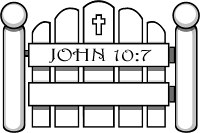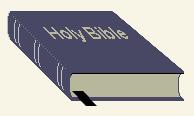"I am" sayings of Jesus reflected in Joseph revealing himself to his brothers
Jesus Christ's seven unique "I am" metaphorical statements about himself in the Gospel of John have corresponding details in the circumstances of Joseph revealing himself to his brothers as recorded in Genesis.
Therefore, this story forms a menorah structure. See Menorah.

Joseph reveals himself to his brothers in Genesis

After two years of famine, Jacob heard that there was corn in Egypt, so he sent ten of his sons to buy some, but kept Benjamin, the youngest, at home.
Their brother Joseph was governor over the land of Egypt, and sold corn to the people. When Joseph's brothers came to buy some, he recognized them, but pretended he didn't know them, and accused them of being spies. They insisted that they were brothers, and had another brother at home. Joseph demanded that they bring the youngest brother to him to prove that they were telling the truth. He detained Simeon, and let the rest go. He had their sacks filled with corn, and their money, and gave them some provisions, and sent them on their way.
When they stopped at an inn, one of them discovered his money in his sack. They returned home, and told their father Jacob what had happened. They told him they would have to take Benjamin there to get Simeon released. When they emptied their sacks, every man's bundle of money was in his sack, which frightened them.
Reuben offered to accept responsibility for taking Benjamin with them to Egypt, but Jacob still wasn't persuaded to let Benjamin go.
The famine continued, and once again, they needed food. Judah offered to accept responsibility for Benjamin, and finally, Jacob was persuaded. So Jacob sent them away with the best fruits they had, and a little balm, honey, spices, myrrh, nuts, and almonds for a gift for Joseph, and twice as much money as before.
When Joseph saw Benjamin with them, he had the men brought into his house. Joseph's brothers were afraid that they would be blamed for not paying for the corn on their earlier trip, but Joseph's servant told them not to fear, because he had collected their money, and he brought Simeon out to them. They gave Joseph the gift, and he asked about their father. They assured him that their father was fine. When he saw his brother Benjamin, he got so emotional he had to leave the room. Then he returned, and they all ate bread.
Then Joseph had his servant fill the men's sacks with corn, and their money, and put his silver cup in Benjamin's sack. As soon as the men had left the city, Joseph had his servant follow them, overtake them, and accuse them of stealing the silver cup. They denied taking the cup, and said that anyone who had the cup could die, and the rest would be Joseph's servants. The men opened their sacks, and the cup was found in Benjamin's sack, so they returned to the city.
Then Judah spoke to Joseph about how grieved their father would be if Benjamin wasn't returned to him. Their father had said of their missing brother Joseph, "Surely he is torn in pieces, and I saw him not since," so he couldn't bear to lose Benjamin as well. Then he offered to take Benjamin's place, so Benjamin could go free.
Then Joseph made himself known to his brothers, and told them that there would be five more years of famine, and that they should hurry and bring his father to him, and their families, and all that they had, so he could provide them with food.
When Pharaoh heard that Joseph's brothers had come, he provided wagons for them. So Joseph gave them the wagons, along with clothes, silver, and food. So they returned to Jacob their father, and told him that Joseph was still alive, and governor over all the land of Egypt, but Jacob didn't believe them until he saw the wagons which Joseph had sent. Then he said, "Joseph my son is yet alive; I will go and see him before I die," and he did.
 "I am the bread of life."
"I am the bread of life."  Joseph's father and brothers were in need of bread. Joseph provided them with bread.
Joseph's father and brothers were in need of bread. Joseph provided them with bread. 